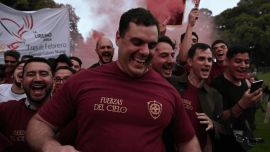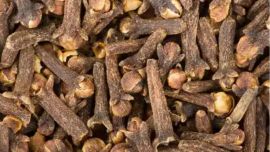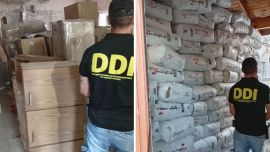Seated on a patch of grass beneath the Obelisk on Avenida 9 de Julio, retiree and piquetero Nino Gindeli, a construction hat at his side, watches thousands of demonstrators prepare for a march to the Plaza de Mayo.
Labour, feminist and indigenous groups have assembled to protest the ongoing economic downturn overseen by Mauricio Macri’s government, a leader many now consider to be on his way out of office, after his resounding loss to Peronist presidential candidate Alberto Fernández in the August 11 primary vote.
“This last vote was a total rejection, not just of the people in government but of the policies of the International Monetary Fund,” Gindeli said.
The atmosphere at the protest is calm, but there is no doubt the protesters are angry, marching to demand assistance for everyday citizens, who have seen their purchasingpower slump as inflation soars and the recession drags on.
“Argentina didn’t go out into the street to break everything, because if we go to the street and break everything, it’s a great motivation to repress us, bully us and accuse us of trying to sack the government,” the 66-year-old continues. “Because of this, it’s important to maintain and make protests, but organised and without violence.”
In economic terms, however, Argentine voters have faced everything but tranquility over the past week. Prior to Sunday’s vote, observers predicted economic bedlam if Macri trailed by more than five points, with creditors and investors fearing a return to policies of aggressive state interventionism, a hallmark of former president Cristina Fernández de Kirchner’s government, who is now Fernández’s running-mate.
By Monday morning, the Fernández-Fernández ticket had won by a full 15 points.
Bedlam arrived.
ROUT
Argentina took a pummelling as the markets opened Monday. The peso surged to 61 against the US dollar from a close the previous Friday below 47. The country’s benchmark stock index, the Merval, crashed 48 percent on Monday, the second largest single-day rout in 70 years, beat only by when Sri Lanka erupted into civil war in 1989, according to Bloomberg.
Though the peso recovered by Friday to 57 per greenback, the damage is done – Argentina’s national currency has lost around 20 percent of its value in just five days. For a country already struggling with high inflation, the prospects for poor and working people looks increasingly grim.
“It’s a punishment,” Gindeli told the Times. “It’s a very strong punishment from a person [Macri] who seems almost stupid, who never listened to the people.”
The primary vote and the ensuing economic backlash reveals a deep contradiction at the heart of Argentine democracy: that the will of a near majority of voters can trigger profound economic pain.
Héctor Torres, a former IMF executive director who helped the international financial institution normalise relations with Argentina in the first year of Macri’s term, said in an interview the country’s next president “will definitely need to articulate the contradiction between markets and democracy.”
“This is a contradiction you can see not just in Argentina but in many countries in the world,” Torres said. “That needs to be articulated, not obliterated.”
‘MONEY IN OUR POCKETS’
While investors, creditors and businesspeople lament the potential departure of the promarket Macri, many voters are nostalgic for the days of Fernández de Kirchner and her late husband, Néstor.
“When Kirchnerism left, we had more money in our pockets than now,” said Dante Di Wezzo, 29, who works in a heating and cooling supply store in Boedo. “Before, money could be used for other things. Now, money helps you eat, and nothing more.”
In a press conference on Monday in the wake of the PASO primaries, Macri, visibly exacerbated, blamed the economic spiral on Kirchnerism’s lack of “credibility in the world,” pointing to previous state intervention in the economy, such as price controls and nationalisation of industry.
“I don’t manage the market, the markets are people who decide [whether] to invest,” Macri said tetchily.
Yet, after an apology to voters, even Macri was forced to intervene in the economy this week, freezing gas prices, eliminating the sales tax for basic foods and raising the minimum wage in a move to placate an angry citizenry.
“The previous government, Cristina's govrernment, thought that politics could overpower the markets,” Torres said. “Macri seems to come exactly from the opposite side. He believes that he has to be re-elected because the markets like him more.”
While Di Wezzo said the week’s economic maladies might be a punishment to proKirchner voters, he said he remained firm in his support for the opposition.
“The truth, I’m not going to change my vote. I’m going to vote the same in October,” Di Wezzo said, referring to the coming general election.
INCREASES
One factor driving voter’s disdain for the economy under Macri is a never-ending increase in prices for consumer goods. On Thursday, a report released by INDEC, Argentina’s national statistics bureau, found that prices had increased by another 2.2 percent in July, a figure sure to be dwarfed in August after this week’s devaluation. Prices over the last 12 months have risen by more than 54 percent.
“I have a friend who yesterday wanted to buy a mattress,” said Nico Merlo, a manager for an apartment building who voted for Alberto Fernández. “The previous week before the election it was 25,000 pesos. You want to know what it was yesterday? 45,000 pesos.”
Another factor fuelling opposition to Macri's government is government’s record US$56- billion bailout with the International Monetary Fund, an institution with historic mistrust among Argentines for its selfadmitted role in worsening the economy in the late 1990s and early 2000s.
“What we have to do is break with the International Monetary Fund, to tell them ‘Take the debt away from here,’” said Gindei, the piquetero. “We’re not going to pay anything, because I didn’t generate the debt. It was generated by the people in government.”
Di Wezzo, the heating and cooling employee, pointed to former president Néstor Kirchner’s break with the IMF in the mid-2000s as a model for a future government to aspire to.
“He paid double to the Fund,” Di Wezzo said. “He paid but he found another solution. He didn’t go to them asking for money like Macri did.”
TENSIONS
Argentina’s hyper-focus on who occupies the presidency likely exacerbates the tension between the economy and democracy, according to Roberto Gargarella, a political scientist and law professor at the University of Buenos Aires.
“For opposition parties in a hyper-presidential system, the best option is not cooperation, but the absolute destruction, the merciless fall, of whoever governs,” Gargarella said. “That’s why it’s so imperative that the government, this one and any other, shows a genuine and honest openness to dialogue with the winners.”
For supporters of Macri – who still managed to return 32 percent of the vote, two points up on his primary showing in 2015 – a return of Kirchnerism spells a return to corruption and populist rule.
Celeste Gallardo, 32, works in an art studio for children, and is a Macri supporter who says she “awaits a change.”
“I’m not in agreement with populist governments,” she told the Times, as her son fed pigeons in the Plaza de Mayo, in front of the Casa Rosada. “I don’t believe they function, and Argentina is not prepared for this.”




















Comments